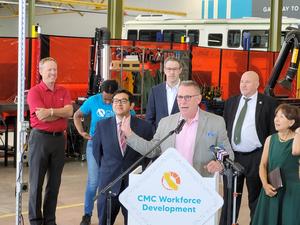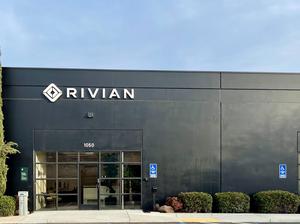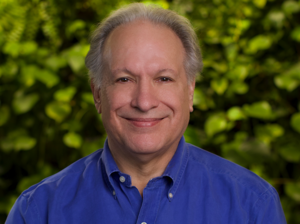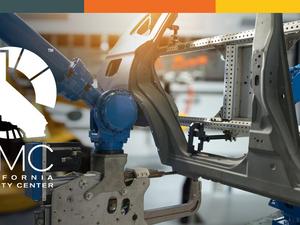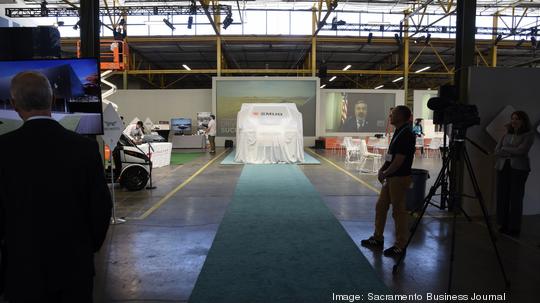
The California Mobility Center is seeking a new CEO to bootstrap the effort to build a statewide center in Sacramento around the zero-carbon transportation sector of the future, just months after it hired its first CEO.
Mark Rosekind, the center's first CEO, left the effort early in April, about six months into the job. His departure followed Sacramento County voters' rejection of Measure A in November, which would have authorized a sales tax to fund transportation-related projects, including development of the Mobility Center.
"There was a lot of optimism around Measure A, but it didn't pass," said Barry Broome, CEO of the Greater Sacramento Economic Council, which has been seeking development of the center for five years.
Rosekind, a former federal transportation official, was hired in October to oversee the development of a $120 million expansion of the CMC.
Measure A would've raised county sales taxes by half a percent to fund transportation projects, with an estimated $212 million in annual revenues. Its failure meant that the CMC didn't get about $100 million to develop the center, Broome said.
Neal Best, the CMC's chief operating officer, also left to seek other opportunities.
"They weren't up for a bootstrap," Broome said. "That's a tall order. It wasn't the same job that they started."
Broome said Rosekind is "a really talented guy and very accomplished" administrator, "but you need a team that wants to work a bootstrap."
Broome said the CMC is in conversations to get a new CEO with a hunger to build a startup.
Rosekind and Best didn't return calls from the Business Journal seeking comment.
In the lead-up to starting the center, Sacramento officials toured Germany. In 2018, the Greater Sacramento Economic Council sent a delegation to visit Rhine-Westphalia Technical University of Aachen and its transportation prototyping spinoff PEM Aachen GmbH. Its affiliate PEM Motion USA is a consulting partner and adviser with the CMC.
Funding the CMC was started in 2019 by the Sacramento Municipal Utility District, which made an initial $5 million investment and committed to up to another $10 million in matching funds.
The current CMC opened in 2020 in 25,000 square feet in Depot Park, a business park on Fruitridge Road in the Power Inn Road area of Sacramento.
From the start, the long-term plan has been to develop a larger center just south of California State University Sacramento as part of the planned 240-acre Sacramento Center for Innovation on Ramona Avenue.
That center would be an asset for — and also supported by — the engineering schools of Sacramento State as well as the University of California Davis.
Broome said the CMC has the support of both schools, the city of Sacramento, SMUD and the state of California, but the center needs the larger facility developed to attract serious statewide interest, which would, in turn, bring the engineering talent for future transportation technologies to the local universities.
"If you don't have the facilities, then you don't have any place to train the engineers for opportunities in future transportation," Broome said.
He cited the recent move by German company Bosch to invest $1.5 billion in a Roseville chip factory dedicated to making chips for electric and zero-emission vehicles as an example of the opportunities in the industry.
"What we need is $125 million to build it," Broome said.
California is dictating industry standards by having the most aggressive zero-carbon transportation goals, including banning the sale of new carbon-emitting cars by 2035 and big rig trucks by 2036.
Those standards are set in Sacramento, which makes the CMC well located, Broome said.
The current CMC has office space for startups and for companies that want to be connected to the zero-carbon transportation future; and it has a ramp-up shop for companies that need tools and equipment to prototype new hardware.
"SMUD very much supports the CMC and its mission to create an innovation hub that spurs clean mobility innovation in this region," said a statement from SMUD. "They have had a lot of success and as a nonprofit are still working to move the needle forward on this economic development project."
Rosekind is a former administrator of the National Highway Traffic Safety Administration. He led the NHTSA from 2014 through 2016, appointed by then-President Barack Obama. Rosekind was also a member of the National Transportation Safety Board from 2010 to 2014. Previously, he has also worked at NASA as a safety official.
